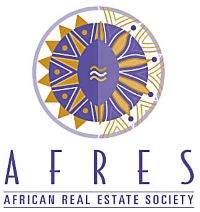About the Journal
The Journal of African Real Estate Research (JARER)
JARER is the official academic journal of the African Real Estate Society (AfRES) and is accredited by the Directory of Open Access Journals (DOAJ). It is an open-access journal (ISSN: 2304-8395) hosted by the Urban Real Estate Research Unit at the University of Cape Town and published by the University of Cape Town Libraries.
History
The JARER was established in 2008 as an initiative of the African Real Estate Society (AfRES) and the Royal Institution of Chartered Surveyors (RICS), with its first volume published in January of that year.
In 2012, the journal was transferred to the Department of Construction Economics and Management at the University of the Witwatersrand (Wits), with Professor Sam Azasu taking on the role of Editor-in-Chief.
In 2018, AfRES moved JARER to the University of Cape Town (UCT), where it was placed on the electronic journal platform OJS. That same year, the journal began proudly receiving support from the International Real Estate Business School in Regensburg, Germany. Since 2018, JARER has been published biannually in digital format.
The 2018 editorial team was appointed as follows:
-
Editor-in-Chief: Professor Felician Komu
-
Chief & Associate Editor: Associate Professor François Viruly
-
Journal Manager: Mr Luke Boyle
In 2019, a new editorial team was appointed:
-
Editor-in-Chief: Professor Abel Olaleye
-
Associate Editor: Associate Professor Aly Karam
In 2021, Vol. 6, Issue 1 featured a special edition titled Women in African Real Estate & Urban Development, guest-edited by Karen Gibler and Geci Karuri-Sebina.
Later that year, Ms Lesedi Kgaka succeeded Mr Boyle as Managing Editor.
In December 2023, Ms Dayni Sanderson was appointed as the current Managing Editor.
JARER remains committed to accessible scholarship and does not charge article processing or submission fees.
Journal Objectives
JARER aims to advance understanding of African real estate markets, including their structure, operations, and reform efforts. The journal explores diverse built environment components such as planning, funding, development, construction, management, ownership, and occupation.
JARER highlights the significance of real estate markets in Africa in areas such as:
-
Real Estate Investment Trusts
-
Property and Economic Development
-
Transformation in the Real Estate Sector
-
Affordable Housing Provision
-
Real Estate Legislation and Policy
-
PropTech and Real Estate Technology
-
Equitable Land Management
-
Innovation in Property Development
-
Urban and National Economic Growth
-
Property Market Maturity
-
Market Studies
-
Financial Sector Development
-
Sustainable Real Estate Development and Management
The journal provides a platform for:
-
Research papers based on completed studies
-
Notes on ongoing or proposed research projects
-
Book reviews
-
Letters commenting on previously published works or other relevant matters
JARER also fosters discourse between researchers and informs African governments and policymakers of the latest developments in real estate research. The journal welcomes papers with strong policy emphasis, including analyses of existing policies or proposals for new ones. Submissions focusing on local, national, regional, or comparative international perspectives are encouraged.
All submissions undergo a double-blind peer review by an expert Editorial Board with specialised knowledge of African real estate issues and current research trends.
Open Access Policy
JARER follows a diamond open-access model, meaning:
-
No fees are charged to authors or readers.
-
All articles are freely accessible online upon publication without embargo.
-
Authors retain copyright and grant third parties the right to use, reproduce, or disseminate their work, provided that proper attribution is given and bibliographic details remain unchanged.
Archiving
JARER preserves and archives its content to ensure continued accessibility and relevance for its readership and stakeholders.
Language
JARER is an English-language journal. Recognising that many contributors are not native English speakers, the editorial team works closely with authors to refine their submissions.
Geographical Diversity
We recognise the geographical disparities in real estate scholarship within Africa, as some countries lack dedicated real estate studies and academic representation in the field. Limited data availability further compounds this challenge.
To address this, the African Real Estate Society has established an MOU with Estate Intel, a private organisation committed to expanding access to real estate data across the African continent, supporting more inclusive and diverse research.
JARER is committed to expanding its author and editorial geographical diversity in the years to come, ensuring representation from underrepresented African countries and voices in real estate research.
Publisher
JARER is published by the University of Cape Town Libraries in South Africa.
Publication Timeline
The average time from submission to publication is 20 weeks.



